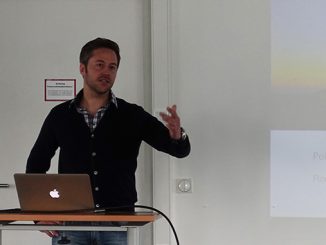
“We should think about how to use our privilege for assuming responsibility for ourselves and for society.” This was one of the most important phrases that were said at this year’s MBS Graduation Gala.
Why? Because this phrase summarizes very well the values that we at Munich Business School prioritize in training our future experts and leaders: acting responsibly for the good of our society and looking beyond one’s own immediate concerns.
MBS places the highest priority on imparting up-to-date, relevant and important knowledge from the fields of business, economy and society in its study programs – and on encouraging our students in acquiring this knowledge autonomously, to discuss it and to challenge it. We strive to generate a teaching and learning atmosphere that enables students to acquire theoretical knowledge and practical skills proactively and in cooperation with others. In our code of values, we call this “co-creating knowledge”.
Knowledge Alone is Never Enough
But this is not yet the end of it: In times of progressing digitization, this aspect cannot be more than just one brick of the wall. To put it clearly: Excellent technical knowledge, good and very good grades are important, but they alone are not sufficient.
The current Skills-Gap Study, conducted by BITKOM Research on behalf of LinkedIn proves that in the future, in addition to technical knowledge, above all social competences such as interdisciplinary thinking, entrepreneurial spirit as well as leadership and intercultural competences will be decisive for succeeding in a global and digital world. All these aspects are included in responsible action.
This is what matters most to us as a university: It is our goal that our students – as future leaders – are not only capable of functioning like entrepreneurs but that they are also qualified by responsible and sustainable thought and action. Already during their studies, our students are given the opportunity to actively practice responsibility in society, for example by getting involved in students associations such as MBS helps e.V.
Students in the Bachelor International Business study program engage in Social Service Projects or in volunteer work in the political, societal, social or cultural domain. This is how they learn to stand up for weaker or less privileged people, taking on responsibility.
It has never been our goal to train students who – after graduation – all take the same road with the same approach and the same definition of personal success. Much rather are we committed to encourage the personal development of our students, thus allowing a wide range of valid personal life concepts to find expression. We achieve this by curricula elements such as self, conflict and team management, communication and intercultural trainings as well as by offers and courses in entrepreneurial responsibility and business ethics.
At the MBS Graduation Gala, Tim Scherer, 2016 Bachelor graduate and former student representative, precisely addressed this issue in his graduation speech. The first phrase of this blog is taken from his speech.
Tim is an excellent example of an MBS graduate who always energetically spoke up for his fellow-students, and who not only absorbed knowledge but challenged it critically, always offering open and constructive feedback. I asked him what success meant for him. Here is his answer: “To me, success means that I set for myself high and honorable goals and to achieve them by my own responsible actions. In addition to professional success, it is also important to me to never quit acquiring ever new knowledge and to be able to form a point of view on societal and political questions.”
Success and Failure
In an impressive way, Tim‘s graduation speech shows the aforementioned aspects of responsible action, different definitions of success and our values at MBS. Therefore, allow me to quote the speech once again:
 “Above all, I thank you for giving me the opportunity to stand here tonight. I have never delivered such an address before, and if you are my age, of course, you will first of all look on YouTube what others had to say in such situations. From this search, one phrase that Joanne K. Rowling said during a speech at the Harvard Class of 2008 stuck in my mind: ‘Many of you might be driven from a fear of failure quite as much as a desire for success.’ This phrase made me think.
“Above all, I thank you for giving me the opportunity to stand here tonight. I have never delivered such an address before, and if you are my age, of course, you will first of all look on YouTube what others had to say in such situations. From this search, one phrase that Joanne K. Rowling said during a speech at the Harvard Class of 2008 stuck in my mind: ‘Many of you might be driven from a fear of failure quite as much as a desire for success.’ This phrase made me think.
Now, failure means different things for different people. For many people, failure has dramatic consequences: If a Syrian would flee from the ongoing war in his country and this flight would fail, he could lose his livelihood and life. If someone fails in building wealth for his family, the children might not be able to go to college. For us, failure has less dramatic implications.
But still, the term failure has very final connotations. Another possible translation of failure (‘to fail’) goes even deeper and means ‘to lose’, and this is personal.
To avoid failure we usually try to break down the big task into smaller ones: You do your Bachelor degree; you do internships to convince people that you are good enough to work for them. Maybe you do the GMAT to show a specific university that you are good enough to do a Master’s degree there. Then you apply with an accounting or a consulting firm. You have a good CV, and chances are high that someone will accept you, after all.
With this approach, it is possible to minimize the risk of failure. You try to circumvent life’s complexity by looking at life as a checklist.
However, success means different things for different people. To some, it means to free themselves from poverty or to be able to send their kids to a university. But to most of us, success means something different: We are privileged; we do not have to worry about having a roof over our head, about our safety or our family’s safety, and we have no financial worries. We already have all these things that other people must work for, must fight for. For us, success means self-realization, recognition in society, assuming responsibility.
But can this type of success be achieved by equaling your life with your CV? I do not know. I am at the beginning of my life; I lack the life experience our parents and many of our professors have. I do not know much about living life the right or the wrong way. That is, if there is anything like living life the right or the wrong way at all. And I think this is the case with most of us.
However, I do recognize that Joanne K. Rowling is right when she states that many of us are driven from a fear of failure quite as much as a desire for success. Thus, we start defining success as the absence of failure and are not even aware of it.
Our environment also has its share in generating this attitude, as well-meant as it may be. If our university emphasizes the importance of networking, this generates an idea in our head of predefined lines and pathways that we can take without risk and that are aimed at avoiding failure.
We should absorb and learn everything that we hear and see and are told and taught, but we also must evaluate it critically and free ourselves from our fear of failure. If we fail, we have a network that will catch us. We have our families; or our friends; some of them we have met during our studies here at this university and they might remain our good friends for a lifetime. This is important, and if we fail, the consequences will be less drastic.
We should not allow ourselves to be driven by an unconscious fear of failure. We should dream of greater things than the next and then the second-next steps of our career plan. We are young and excellently trained. We do not have to take the easiest and least risky way. If we fail, we should tell ourselves ‘You failed, you try again’. At this moment, tonight, where all the doors of the world are open to us, we should remember what we once dreamt, what we wanted to become and achieve. We should think about how to use our privilege for assuming responsibility for ourselves and for society. We should find out what the term success means for us and then go for it! Thank you very much!”




